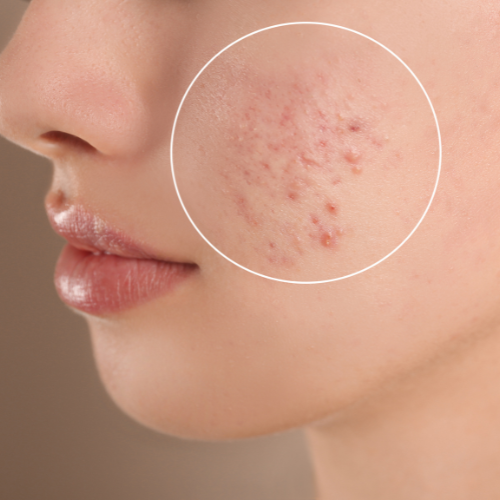
How do we define Acne?
Dermatological acne is also known as acne vulgaris. It is a common skin condition that leads to an outbreak of blackheads, whiteheads, and pus-filled spots. Acne vulgaris is usually triggered by hormonal changes that occur during puberty. It can appear in so many places around the body from the neck, back face, and chest.
During adolescence, this will generally get worse.
Dermatological acne, also known as acne vulgaris, is characterized by the formation of pimples, blackheads, whiteheads, cysts, and nodules on the skin. These blemishes typically appear on the face, neck, chest, back, and shoulders, where oil glands are more prevalent. Several factors contribute to the development of dermatological acne, including:
- Excess Oil Production (Sebum): Sebaceous glands in the skin produce sebum, an oily substance that helps lubricate and protect the skin. However, overproduction of sebum can lead to clogged pores, providing an ideal environment for acne-causing bacteria to thrive.
- Clogged Pores: When dead skin cells and excess oil accumulate in hair follicles, they can form a plug, leading to the formation of blackheads or whiteheads.
- Bacterial Infection: Propionibacterium acnes (P. acnes), a type of bacteria that normally resides on the skin, can multiply rapidly in clogged pores, triggering inflammation and the formation of inflammatory acne lesions.
- Hormonal Fluctuations: Hormonal changes, such as those that occur during puberty, menstruation, pregnancy, or while taking certain medications, can stimulate the sebaceous glands to produce more oil, exacerbating acne.
- Genetics: Family history can play a significant role in predisposing individuals to acne. If one or both parents experienced acne, their children are more likely to develop it as well.
Scarring is most likely to take place when someone has severe dermatological acne. This will ultimately cause a lack of confidence.
Many people who haven’t found over-the-counter products to be effective have contacted us for advice. Treatments can take between to 2-3 months but once they get to work, they are very effective. Your recommended treatment plan is subject to how severe your acne is. This will all be discussed with you during a consultation with Natalia.
Once you’ve had your consultation and treatments with Natalia she will advise how to do your best to keep it all under control including:
- Maintain a Consistent Skincare Routine: Cleanse your skin twice daily with a gentle cleanser to remove dirt, oil, and makeup. Avoid harsh scrubbing, which can irritate the skin and worsen acne.
- Use Non-comedogenic Products: Choose skincare and makeup products labeled as non-comedogenic or oil-free to prevent pore blockages.
- Avoid Excessive Sun Exposure: While sunlight may initially improve acne, prolonged sun exposure can lead to skin damage and worsen acne in the long run. Always apply a broad-spectrum sunscreen with SPF 30 or higher before going outdoors.
- Practice Stress Management: Stress can exacerbate acne by triggering hormonal fluctuations. Incorporate stress-reducing activities such as meditation, yoga, or deep breathing exercises into your daily routine.
- Follow a Healthy Diet: While the link between diet and acne is complex, consuming a balanced diet rich in fruits, vegetables, whole grains, and lean proteins can support overall skin health.
Remember, patience and consistency are key on the journey to clearer skin.

Contact us for more information on Dermatology.
Appointments can be made via our Booking Page, email, or via phone. Please be advised that our secretary may need to ask some personal questions to help decide which appointment type is most suited to your needs.
As of May 1st 2024 our Dermatology & GP prices have changed to the following:
1. Dermatology Consultation – €180
2. Follow Up Dermatology Consultation (Must be within 4 weeks of 1st consultation) – €100
3. First Time GP Consultation: €75 Euro
4. GP Consultation for Existing patients – €60
